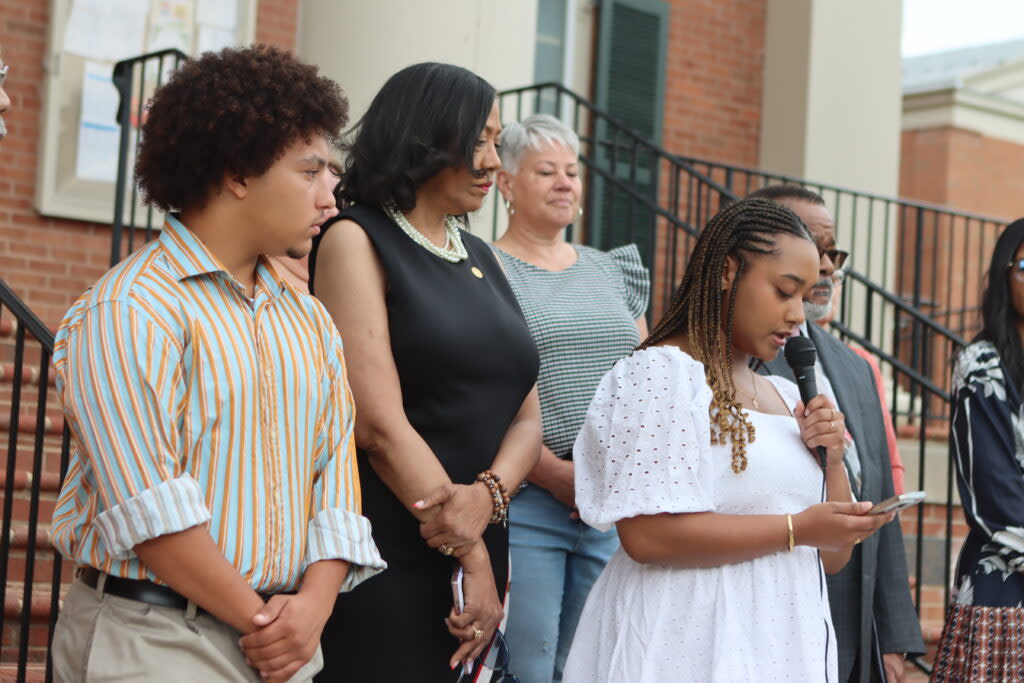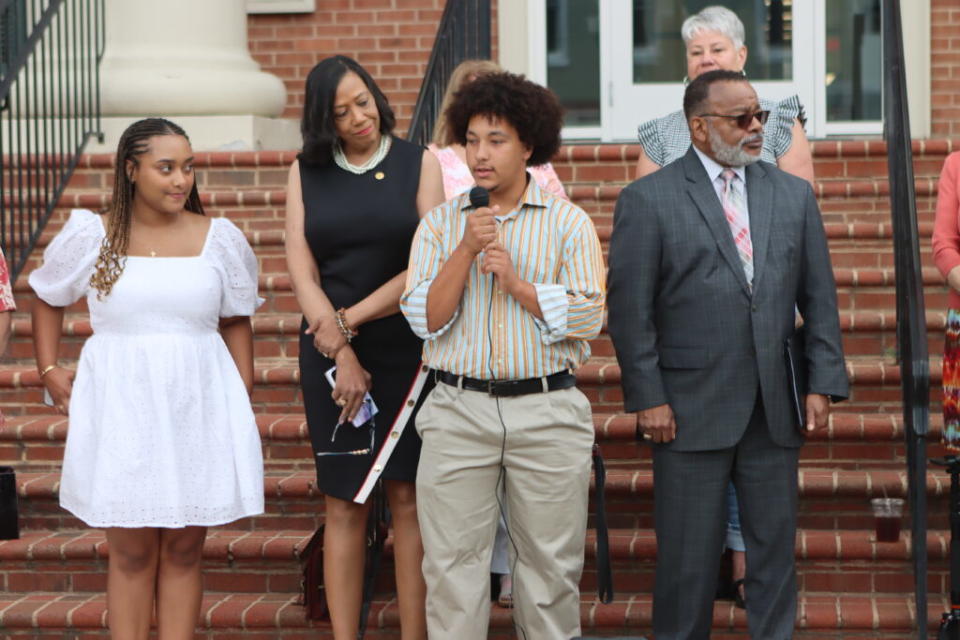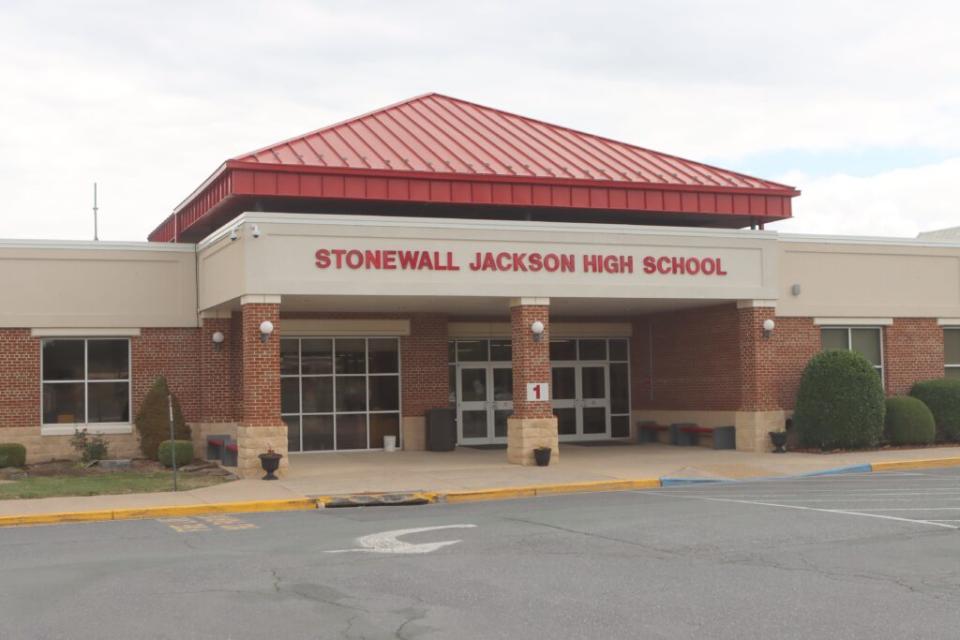‘Disappointed’: Black students suing Shenandoah school board for restoring Confederate names

- Oops!Something went wrong.Please try again later.
Briana Brown speaking in front of the Shenandoah County Circuit Court on June 11, 2024 (Nathaniel Cline/Virginia Mercury)
After a Virginia school district made headlines around the world for rebranding two schools with Confederate leaders’ names, two rising seniors at one of the schools are leading community opposition to that decision.
The two said they were “disappointed” after the school system voted to rebrand schools with Confederate names on May 10, four years after the district stripped the names.
The students are now taking responsibility for representing a small population of Black students in a Virginia NAACP-backed lawsuit against their school board for allegedly “reaffirming discrimination” after voting to revert Mountain View High School back to Stonewall Jackson, and Honey Run Elementary School to Ashby-Lee after Confederate Gens. Turner Ashby and Robert E. Lee. The Confederate names were removed in 2020.
According to recent data from the Virginia Department of Education, the two students represent 2.9% of Black students in Shenandoah County Public Schools.White students make up 73% of the student population, Hispanic students represent 17% and the remainder being Asian, Indigenous and Pacific Island students.
“Nobody really cared about how this mentally affects students, makes them feel unsafe and unwanted in their learning environment and that’s something that should have never been the case,” said student Briana Brown, who attends Massanutten Regional Governor’s School, based at Mountain View High School.
Brown, one of the rising seniors on the lawsuit, said some of her peers felt hopeless during the renaming process and after the decision. She said she’s pleased that she’s gained support following her decision to speak out against the board’s decision.
Between the 1950s and 1960s, local leaders in Shenandoah County named public schools after Confederate leaders. Some did it in protest of the U.S. Supreme Court’s 1954 decision to desegregate schools.
A.D. Carter V, the son of a government teacher and a student plaintiff in the lawsuit, said at the announcement of the lawsuit in June that history upsets him.
“The reason they had done that was that they were trying to disincentivize Black people from attending that high school … and so they had used it specifically as a scare tactic to try and keep them out,” Carter said.

Attorneys from Guynn Waddell representing the school board are requesting the court dismiss the case because the complaint fails to prove that any student has been coerced into supporting the board’s decision against their will or harmed for refusing to do so.
“The only alleged harm is emotional and psychological, or speculative and potential,” the attorneys wrote. “The claims are simply not ripe for adjudication because no student has alleged that they suffered actual harm. Hurt feelings will not suffice.”
The Virginia NAACP alleges in the suit that the school board violated the U.S. Constitution, Title VI of the Civil Rights Act of 1964, and the Equal Educational Opportunity Act. The plaintiffs seek to remove the Confederate names, mascots and vestiges, and to prevent any future school naming involving Confederate leaders or references to the Confederacy.
Some Virginians believe the Confederacy represents a heritage of Southerners’ courage against the federal Union while fighting for the rights of southern states. Others, like the students and lawsuit’s plaintiffs, view the Confederacy as defenders of slavery and a foundational part of America’s history of racism.
In recent years, Virginians have been working to address the commonwealth’s history of white supremacist ideology and historical practices of creating unfair advantages for white people by implementing policy changes and hosting community discussions on these topics. Signs, symbols and statutes of the Confederacy have also been renamed or removed.
Immediately following the board’s decision to reverse the school names, the monikers were changed with the help of the donations collected by the Coalition for Better Schools.
Mike Schiebe, a spokesperson for the group, said approximately $70,000 in private donations have been spent to help with name-changing expenses, compared to the approximately $300,000 in 2020.
Former board members said the 2020 costs were covered by $135,000 from unused salary accounts for frozen positions, and $133,284 from residual Shenandoah Valley Regional Program for Special Education tuition. Shenandoah Forward, which was founded by community members, raised the remaining amount, under $40,000.
Students will be starting school in Shenandoah County on August 13.
“We stand with our clients as they’re about to experience having to walk into the doors again of these schools with these Confederate names and certainly understand that this presents a real challenge for them,” said Kaitlin Banner, deputy legal director for the Washington Lawyers’ Committee for Civil Rights and Urban Affairs.

Attorneys from the Washington Lawyers’ Committee and Covington & Burling LLP are representing the plaintiffs — the NAACP and five current students in Shenandoah County Public Schools including Brown and Carter.
Before the lawsuit, Virginia NAACP President Cozy Bailey Bailey urged the school board to oppose renaming the schools after Confederate leaders.
“Memorializing that historical reality by naming your public schools after Confederate military leaders and sympathizers subverts part of your district’s mission that claims that ‘all members of the learning community are valued and respected,’” Bailey wrote in a May 8 letter. “Students must believe they are valued and protected in order to thrive.”
Many of the school board members did not directly comment on the lawsuit during a June 19 business meeting.
However, Board Member Gloria E. Carlineo defended division staff for taking “nasty” and “harassing” calls following the board’s decision to put the Confederate school names back in place.
“We are fully committed to fighting this lawsuit to the fullest extent of the law and we are confident that the whole truth will come out,” Carlineo said.
Banner said the court is considering a hearing between September and early October.

